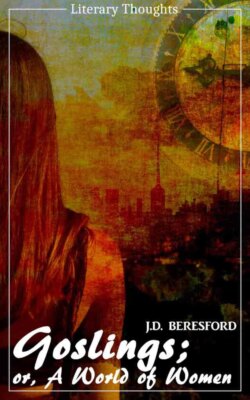Читать книгу Goslings (John Davys ("J.D.") Beresford) (Literary Thoughts Edition) - J. D. Beresford - Страница 12
На сайте Литреса книга снята с продажи.
III—LONDON’S INCREDULITY
Оглавление1
Jasper Thrale’s mission was no easy one. England, it appeared, was slightly preoccupied at the moment, and had no ear for warnings. Generally, he was either treated as a fanatic and laughed at, or he was told that he greatly exaggerated the danger and that these matters could safely be entrusted to the Local Government Board, which had brilliantly handled the recent outbreak of foot-and-mouth disease. But there were some exceptions to this rule.
His first definite statement had been made to his own editor, Watson Maxwell of the Daily Post.
“Yes,” said Maxwell, when he had given Thrale a patient hearing, “it is certainly a matter that needs attention. Would you care to go out as our special commissioner and report at length?...”
“There isn’t time,” replied Thrale. “The thing is urgent.”
Maxwell brought his eyebrows together and looked keenly at his correspondent. “Do you really think it’s so serious, Thrale?” he asked. “After all, what evidence have you, beyond the Chinese reports?”
“I know there are several cases in Russia,” said Thrale.
“Yes, yes; I don’t doubt that,” returned Maxwell, with a touch of impatience. “But unless you can bring evidence to show that this new disease is as deadly as you say, it is not a matter that I could give space to at the present time. For one thing, the Evening Chronicle has been making rather a feature of it for the last three or four days, and I don’t see that I could do much unless we had some special inside information. Then, the House will be sitting again next week, and it seems to me not altogether improbable that we shall have a stormy session, which will mean that a good deal of ordinary matter will have to give way....” He broke off, and then added, with a friendly smile: “But if you would go out as our commissioner, we should be glad to make you a proposal.”
“There will be no need for a commissioner in a week’s time,” replied Thrale. “You don’t seem to understand that I’m not looking out for a job. I don’t want to write articles; I don’t want to be paid for the information I can supply. I foresee a grave danger, which is growing more grave hourly by reason of the Russian Government’s censorship of all reports referring to the plague. It is a danger which should be understood at once. If you send any commissioner, send the cleverest physician you can find, and a bacteriologist.”
There could be no doubt of Thrale’s earnestness, and Maxwell, who was not only a very capable editor, but also an able and intellectual man, was impressed. Unfortunately, the interests of his proprietors at that moment necessitated a great effort to prop up the very unstable Liberal Government, which had been in power for four years and was now on its last legs. It was so essential from the proprietors’ point of view—three of them were on the Government front bench—that the dissolution should be postponed until such time as the Ministry could go to the country with a reasonable prospect of success. A tentative English Church Disestablishment Bill was to be introduced in the coming session, and it was hoped that if the Government had to go to the country they could make a platform on that one clear issue. It was a good Bill, designed to win the Nonconformist vote, without completely alienating the High Church party. In other words, the Government was eager at that moment to please the majority of the electors, which is, presumably, the highest object of a representative government.
“If it had been at any other time,” said Maxwell, and pushed his chair back.
Thrale understood that the interview was at an end. He rose from his chair and picked up his hat.
“We shall be glad to print any articles you care to send us,” said Maxwell, with his kind smile, “but I can’t undertake a campaign, you understand, at the present moment.”
It was nearly four o’clock, but Thrale just managed to catch Groves of the Evening Chronicle.
